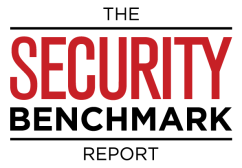
Benchmark Leader Profile
Archer Daniels Midland (ADM) is an agricultural supply chain organization involved in a range of sectors such as farming, food processing, and forestry. Headquartered in Chicago, Illinois, and established more than 100 years ago, ADM has since spread to approximately 200 countries and six continents.
“ADM is historically a commodity trading and food processing company. This involves your traditional commodity — corn, beans, and things of that nature — and ADM buys, sells, trades, transports and refines these commodities,” explains Brian Howell, Vice President, Global Head of Security at ADM. “Additionally, ADM has a nutrition division now that it is very focused on. Basically, this involves what we eat and how that diet can be enhanced in a good way. ADM is also involved in animal nutrition of all sorts, including pets, aquatic species and large livestock.”
Documenting best practices
To improve security, ADM focuses on sharing information and documenting best practices. One way ADM approaches information sharing is though the distribution of an internal webcast and newsletter. The webcast and newsletter were designed to forecast potential incidents and explore past learnings.
“Because of ADM’s massive global reach, pretty much any geopolitical incident or labor related issue will rub up against our business in some way or another. If it’s involved in supermarkets, it rubs up against us. If it’s in farming, it rubs up against us,” Howell says.
Howell states that they managed these situations well, which inspired the idea of this internal information sharing. “We recognized we were using a ton of institutional knowledge. We needed to be able to use what we’d learned there in these very tense situations to train or embed that muscle memory in the company. That way, it doesn’t die with the people that managed it.”
Documenting best practices allows ADM to adapt to the shifting regulatory landscape. The passing of California Senate Bill 553 presented unique regulatory challenges for many organizations, but Howell states that ADM was able to roll with the changes. ADM’s previously documented and developed workplace violence training program helped the organization to adjust. However, ADM’s workplace violence training and documentation doesn’t end with California-based operations.
“Something we’ve done that has really set us up for success, is we don’t act like this will be the last state that implements greater workplace violence laws. We said, ‘We’re not only going to implement proper compliance, we’re going to do it in a manner that we document it,’” Howell says. “That way, we can replicate it within our workplace threats division that handles these types of issues, we feel it is mature, well trained and experienced in execution. If laws like this spread to Illinois or Kentucky or one of the other states that we have really large workforce in, we can scale up quickly.”
The war in Ukraine
ADM has a large presence in Ukraine, as it is a prominent agricultural country. Naturally, the war in Ukraine can impact business operations and employee safety. Given the circumstances effective security processes are paramount. Therefore, ADM, with experienced third party support, established a 24/7 global security operations center (GSOC). This GSOC is designed to track company vehicles with enhanced precision and provide comprehensive wellness checks in the event of an attack. The GSOC also provides evacuation, medical support, and surge capability when additional security support is required.
 We recognized we were using a ton of institutional knowledge. We needed to be able to use what we’d learned there in these very tense situations to train or embed that muscle memory in the company. That way, it doesn’t die with the people that managed it.
We recognized we were using a ton of institutional knowledge. We needed to be able to use what we’d learned there in these very tense situations to train or embed that muscle memory in the company. That way, it doesn’t die with the people that managed it.
“Essentially, what it did was take all the services we were offering in our global security department and provide them faster with local resources by Ukrainian staff that speak the language, have better knowledge of the country, and can probably provide better service than we could externally,” Howell explains. “It also maintains contact with different aspects of military and diplomatic infrastructure within the country, so the GSOC could monitor intelligence and give a heads up when maybe certain weeks are going to be worse than others.”
ADM has seen success with these GSOC operations, and it continues to refine protocols so that business operations do not only exist, but flourish.
“The nature of our production sites requires employees to shelter in place, which is often as the air alerts are daily. But employees can’t leave business unattended, because we’re running large industrial sites, and you could also have an industrial accident,” Howell says. “They were able to shorten the time it takes to shelter in place. So, if you’re loading a ship at the port, it might take you seven or eight minutes to run to the nearest shelter, unless we can get a shelter closer to you. Part of it has been creating alternative shelters. Part of it has been redefining what our minimum staffing requirements are. Part of it has been partnering with a third party to track airstrikes coming into the country. And we look at it week by week.”
Looking to the future
ADM is always looking forward to push its successes in security even further. For the remainder of 2024 and going into 2025, the organization aims to institute business continuity training for global security teams. By highlighting the processes the organization is protecting, ADM believes it will pave the way for the development of formative metrics in complementary programs.
As the Vice President, Global Head of Security, Howell’s responsibilities include providing oversight to the organization’s security teams. Therefore, Howell took action to support this company-wide goal.
“I set a goal that every regional manager at ADM in global security would be certified in business continuity by the end of the year, even if they didn’t have direct oversight for their area,” Howell says. “We’ve accomplished that.”


